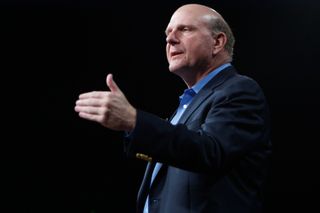Ballmer claims Windows 7 saves £100 a seat
Microsoft's chief executive Steve Ballmer argued the business case for its latest OS Windows 7, and claimed the Server 2008 update can compete with VMware.

Windows 7 has won positive reviews, but is Microsoft's latest operating system worth the money as IT budgets continue to shrink?
That's the very question Microsoft's chief executive Steve Ballmer addressed at a meeting today in London. He claimed that the new operating system saved some of its early adopters as much as 120 a desk - especially when paired up with Windows Server 2008 R2.
He claimed Baker Tilly has saved 100 per PC since rolling out Windows 7, while the operating system's streamlined management saved the Isle of Man's government some 120 per seat.
While the recession has put cost savings at the top of every business' agenda, Windows 7 wasn't designed just for cost savings. "When we started building Windows 7 three years ago, no one was talking about the new normal,' the new efficiency' or anything," Ballmer admitted.
BT and BAA save
BT's chief technology officer for end users Peter Scott told attendees that Windows 7 helped consolidate security, as the VPN, firewall and other security features meant BT didn't need to look to a separate provider. Aside from cutting costs and complexity, this means BT has "one throat to choke if something goes wrong," he said.
He added that using Windows 7 on older hardware has helped extend the life of those machines, which struggled to run other systems.
Get the ITPro. daily newsletter
Receive our latest news, industry updates, featured resources and more. Sign up today to receive our FREE report on AI cyber crime & security - newly updated for 2024.
However, there are some downsides. He noted that using Windows 7 requires upgrading to Internet Explorer 8, which doesn't work too well with some applications.
BAA's chief information officer Philip Langsdale said Windows 7 helped reduce complexity, especially used alongside the Server 2008 R2. "I hate complexity, I hate diversity in tech it just breeds cost and complexity in services," he said.
Innovation
While cost cutting might be at the forefront of everyone's minds, firms should look to innovate, too, Ballmer said.
"It's a time of incredible innovation despite the though economy or maybe because of the tough economy. It's time to put our thinking caps on to be more innovative," he added.
"It's a fun year for us. There's nothing better than releasing a new product," he said, admitting Microsoft's "fun" often added to IT departments' workloads.
It's certainly been more fun than two years ago when Vista was released. While Ballmer again stressed that Vista has been installed as much as XP, he admitted there was "more vibration in place around Vista then I'd hope to see around Windows 7."
He expects to see Windows 7 deployed as people buy new computers, with it "the default choice on your new PC even if you don't convert the whole install base."
Ballmer added: "It would be a shame to see people continue to acquire Windows XP machines in the year 2010."
Virtualisation and Windows Server 2008 R2
Virtualisation has been pushed as a major cost saving system for the past few years, but Microsoft is only really making its move with the release of Windows Server 2008 R2, which includes more Hyper V features.
"We know we have a much more cost effective solution than VMware," he said, referencing Microsoft's main rival in the space.
"Why should you spend the money to get the solution which is very expensive from VMware in my opinion," he said, admitting he's the "least unbiased person on the planet."
Ballmer argued that Microsoft's system can also manage VMware deployments, so there's no reason to feel pressured to "rip and replace" to move to Microsoft's Hyper V.




